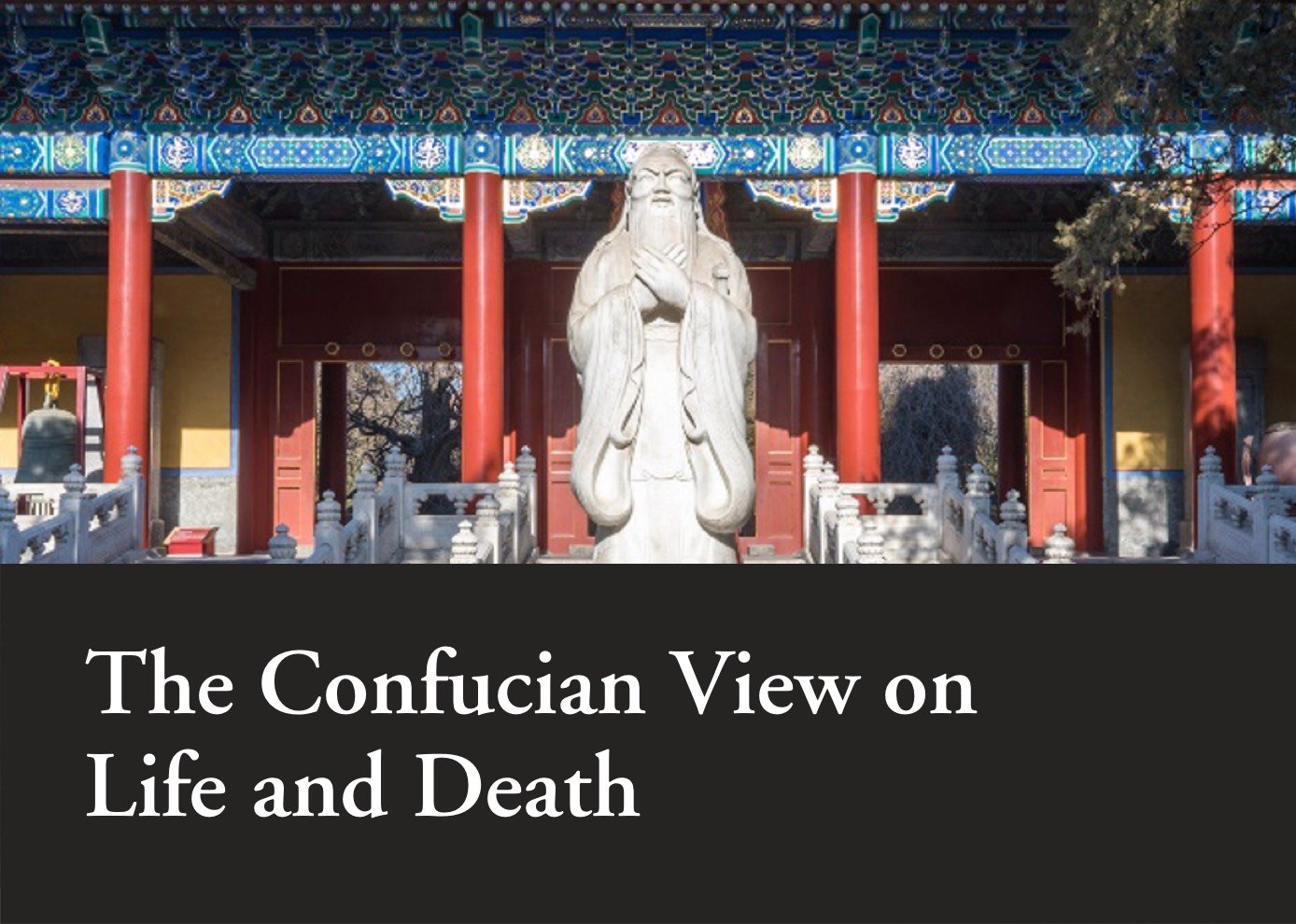The Confucian View on Life and Death
The Confucian View on Life and Death: In the pursuit of noble moral standards and harmony between man and nature, pain arises from the inability to realize moral and professional achievements (道德超越,天人合一,苦在德业之未能竟).
The Confucianism holds that “life and death are predestined, and wealth and honor are in the hands of Heaven.” Therefore, it values the present life rather than the afterlife. Confucius (孔子, 551-479 B.C.) said, “Not knowing what life is, how can one understand death?” During lifetime, men should fulfill their responsibilities, striving to build a harmonious society in which “The Tao prevails under Heaven”. Humans are finite individuals in the real world, nevertheless, by cultivating virtue and knowledge, they can transcend their physical limitations to achieve the ideal “Way of Heaven”. Just as the Book of Changes (《易经》, Yijing) states, “As Heaven maintains vigor through movement, the noble-minded should constantly strive for self-perfection.”

Mencius (孟子, 372-289 B.C.) said in the classic Mencius: On the Exertion of the Heart (Part One) (《孟子·尽心上》), “Preserving one’ s true nature and nurturing one’ s virtuous qualities are the approach to following the Way of Heaven. Whether life is brief or enduring, cultivating oneself is the way to establish life goals and missions (存其心,养其性,所以事天也。夭寿不贰,修身以俟之,所以立命也).” That is to say, if one can preserve their true nature, nurture their virtuous qualities to fulfill the requirements of Way of Heaven, the lifespan becomes inconsequential. The key is to cultivate one’s virtue and knowledge, achieving a state of establishing purpose in life. In this sense, “harmony between man and nature (天人合一)” represents an immortal state of life.
Therefore, ancient sages believe that human life is finite, but the spirit can transcend limitations to achieve immortality. Thus, the concept of “the Three Deeds to Immortality (三不朽)” emerges, which says that “the highest is the establishment of morality and integrity, the next is the establishment of achievements and another is the establishment of valuable speeches. His body extinguishes while his establishment remains (太上有立德,其次有立功,其次有立言。虽久不废,此之谓不朽。).” (referred to the translation by Luo Zhiye) Luo Lun (罗倫, 1431-1478), a Confucian scholar from the Ming Dynasty, said that “Everyone is mortal. Sages are no exception. The difference lies in that sages do not truly vanish after death; instead, they coexist with nature, shining alongside the sun and moon forever (生而必死,圣贤无异于众人也。死而不亡,与天地并久,日月并明,其惟圣贤乎!).”
Sages differ from ordinary people in their contributions in moral cultivation, lofty deeds, and profound knowledge for the society during their lifetime. That’s why their spirit endures alongside the nature even after their death. This kind of immortality is purely spiritual, holding significance in society and morality, but not directly linked to individual life and death. Zhang Zai (张载, 1020-1077), a great thinker and educator of the Northern Song Dynasty, once expressed that “when alive, I adapt to nature and act properly; when dead, I return to nature and accept it peacefully (存,吾顺世;没,吾宁也。)”. It means that one should strive to fulfill his social responsibilities when alive, so when he departs this earth, he will be peaceful.
Judging from the above analysis, the Confucians do not view death as pain, so do they suffer from pain in their lives? According to Confucianism, on a personal level, the pain comes from the failure to cultivate virtue and pursue learning. And a much greater pain arises from the inability to realize societal ideals. The litterateur of the Southern Song Dynasty, Lu You (陆游, 1125-1210), wrote a poem titled Testament to My Son before his death. The poem says, “After my death I know for me all hopes are vain; But still I’m grieved to see our homeland not unite! When Royal Troops recover the Central Plain. Do not forget to tell your father in sacred rite! (死去元知万事空,但悲不见九州同。王师北定中原日,家祭无忘告乃翁。)” (referred to the translation by Xu Yuanchong) Lu You’s pain is not about his own death but no chance to witness the reunification of the Song Dynasty.

In the late Southern Song Dynasty, another Confucian, Wen Tianxiang (文天祥, 1236-1283), left the following words on his belt of clothing before his execution. “Confucius emphasizes the attainment of benevolence and virtue while Mencius advocates the pursuit of righteousness. It is only by wholeheartedly and diligently engaging in righteous deeds that one can achieve the state of benevolence and virtue. What else do we expect to learn from reading the works of sages and wise men? Perhaps, both now and in the future, we can live without a sense of guilt (孔曰成仁,孟曰取义,唯其尽义,所以仁至,读圣贤书,所学何事?而今而后,庶几无愧。).” Wen Tianxiang faced death calmly and unflinchingly as he could meet his end without regrets, having lived in accordance with the moral ideals of “sacrificing oneself for benevolence or justice (殺身成仁、捨身取義)” put forward by Confucius and Mencius. Therefore, in the perspective of Confucianism, the pain does not lie in how one dies but in how to fulfill benevolence and righteousness. In the Confucian view of life and death, pain arises from the inability to realize moral and professional achievements.
All articles/videos are prohibited from reproducing without the permission of the copyright holder.




Welcome to leave a message:
Please Sign In/Sign Up as a member and leave a message